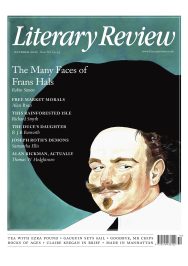Robert Service
Behind Every Great Man
Personality and Power: Builders and Destroyers of Modern Europe
By Ian Kershaw
Allen Lane 512pp £30
It would be hard to find a reputable historian still professing the ‘great man’ theory of history. Widely said to have originated with Thomas Carlyle in the 19th century, the theory had really been the stock-in-trade of annalists since history started to be written, and only the very best historians avoided it. Carlyle’s heroes were extraordinary individuals such as the Prophet Muhammad and Emperor Napoleon, who took their peoples by storm and spread their influence far and wide. Among those who disagreed with Carlyle was Karl Marx. Bedded deep in Marxism was the contention that whenever single leaders have been able to exercise unbounded power, it is because they have taken advantage of an adventitious equilibrium of class hostilities. In Marx’s opinion, individuals who pranced on the balconies of state were usually the puppets of wider economic and social forces.
The obvious irony is that Marxists in the 20th century were responsible for extravagant hero worship. Lenin was mummified and kept in a mausoleum, where his corpse still remains on display. His successor, Stalin, organised a cult of his own that was even more excessive. Mao remains the object of cultic reverence in present-day Beijing.
While paeans to greatness are rarer in democratic states, they are far from being non-existent. Much of the press is scandalised if Winston Churchill’s career is deprecated. Politicians join in hero worship and antihero hatred. Margaret Thatcher’s name was endlessly invoked by the candidates in the recent Conservative

Sign Up to our newsletter
Receive free articles, highlights from the archive, news, details of prizes, and much more.@Lit_Review
Follow Literary Review on Twitter
Twitter Feed
How to ruin a film - a short guide by @TWHodgkinson:
Thomas W Hodgkinson - There Was No Sorcerer
Thomas W Hodgkinson: There Was No Sorcerer - Box Office Poison: Hollywood’s Story in a Century of Flops by Tim Robey
literaryreview.co.uk
How to ruin a film - a short guide by @TWHodgkinson:
Thomas W Hodgkinson - There Was No Sorcerer
Thomas W Hodgkinson: There Was No Sorcerer - Box Office Poison: Hollywood’s Story in a Century of Flops by Tim Robey
literaryreview.co.uk
Give the gift that lasts all year with a subscription to Literary Review. Save up to 35% on the cover price when you visit us at https://literaryreview.co.uk/subscribe and enter the code 'XMAS24'